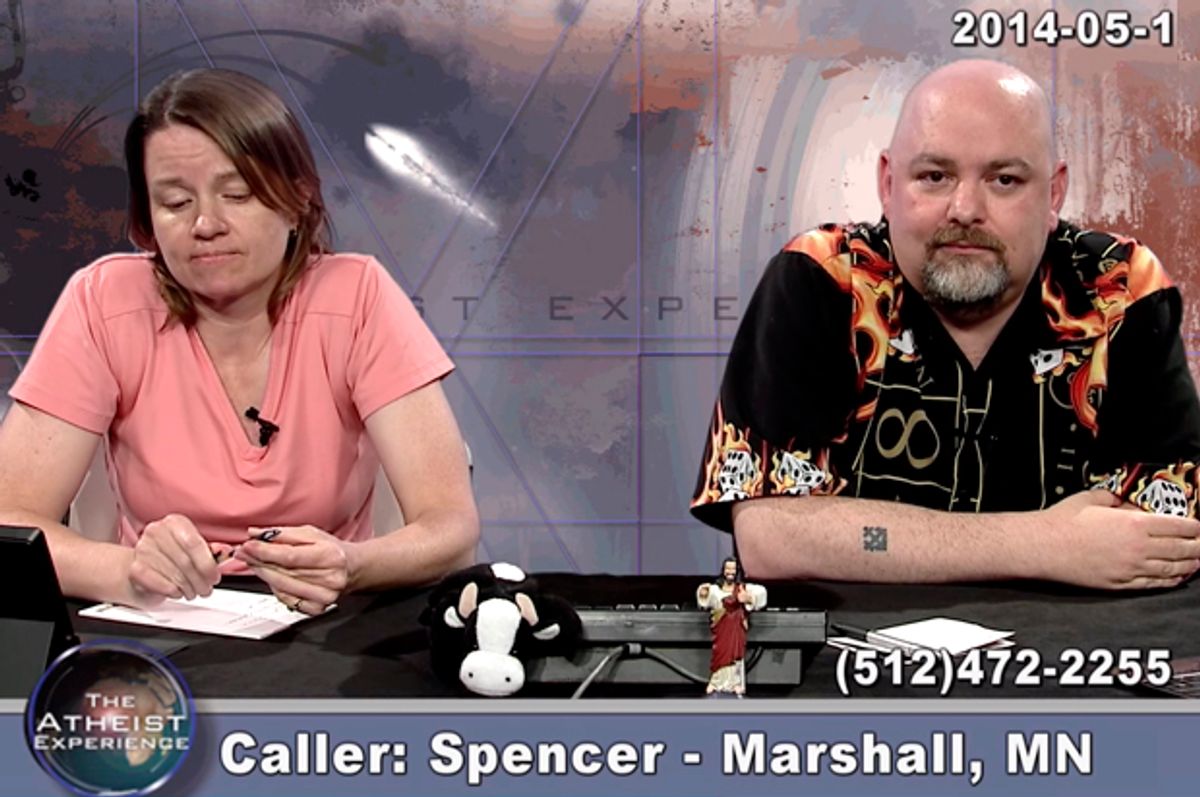The Christian right has some things figured out. These days, Christian entertainment isn't just the didactic "700 Club" -- it includes spectacles as high-flying as History's miniseries "The Bible" or as wacky as GSN's "American Bible Challenge." If these entertainments, relying as they do on knowledge of the source material, do any converting, that's a fringe benefit; they exist to further galvanize the faithful in their beliefs.
American atheists haven't learned from these projects, it seems. The recently-launched AtheistTV, which is available over the Internet and through the Roku streaming device, frames itself as an outreach project of sorts. It consists of acquired programming (for instance, from the Richard Dawkins Institute), with call-in shows and broadcasts of speeches and rallies. All of these set forth the tenets of atheism -- there's no "American Bible Challenge"-style tomfoolery here.
And yet after watching four hours of its programming and even despite my own lack of religious belief, I find it hard to imagine that even a casual nonbeliever would tune in, let alone someone on the fence about the existence of a higher power. AtheistTV adheres to nasty stereotypes about atheism -- smugness, gleeful disregard for others' beliefs -- to a degree that's close to unwatchable.
When I first tuned in at 2 p.m. on Thursday, the closing credits for a show were scrolling, set to a parody hymn that rhymed "Don't be offended by a word to the wise" with "There's no real estate in the skies." Then, after several seconds of dead air, came a prerecorded call-in show called "The Atheist Experience," whose co-host Matt Dillahunty, wearing a black Hawaiian-style shirt decorated with flames and infinity symbols, needed no prompting to begin his show with the Biblical story of God asking Abraham to sacrifice his son Isaac. "This is just absolutely horrible," said Dillahunty. "And it’s the type of thing we get when we begin with the idea that the Bible is true and good, and you run into absurdities."
What absurdities these were the viewer would have to fill in for himself; there was no extrapolation from this story in terms of what social ills have happened in the name of God, no sense that Dillahunty was bothered by people following the Bible for any reason other than that he thinks it's nuts to rely on a book for wisdom and guidance. "I don't worship any being," he said, "though I respect a lot of people and a lot of fictional characters."
"If you know why your God is so stupid," he said, "feel free and call us."
The show did field one call, from a young man whose thoughts were so muddled (he was introduced as devout, then explained he was questioning his faith, then said he'd been dead for a week, then said he often thought the world would be better off after he died) that it's not really fair to criticize. But it's worth noting that Dillahunty repeatedly suggested he was dealing with a prank caller but refused to disengage and make time for a caller who might have done a better job of representing himself; it was more important to score rhetorical points off someone clearly not equipped to play.
AtheistTV frames atheism as a perpetual reaction against a conquering force. And that reaction isn't reasoned debate. It's unattractive nihilism. After the second broadcast of a single "Atheist Experience" episode, the channel showed a 2012 rally in Washington, D.C.; speakers consistently described a future in which all Americans would join the movement, a future that they'd get to by mocking and hassling the beliefs of others. One hardly needs to be religious to see the rhetorical flaws in Andy Shernoff, the frontman of punk band The Dictators, describing himself as "a little like Martin Luther King" before asking the audience "Ready for some sarcasm? Ridiculous ideas need to be mocked." That Shernoff's performance indulges straight-up homophobia and misogyny in a frankly mean-spirited song about giving Jesus oral sex is just a fringe benefit of being a radical truth-teller who doesn't care whom one offends. Beyond the catharsis of mockery, what can AtheistTV offer? What alternative does it provide? Leaving aside even the question of winning over believers, how can it even keep atheists watching if it's just a perpetual drumbeat of calling Jesus "the zombie Jew"?
After the rally broadcast, in the final episode of "The Atheist Experience" I watched, both hosts recommended that viewers tune into "Cosmos," on Fox. That show, starring the scientist Neil deGrasse Tyson, made the argument that the religious right had deleterious effects on the world by using concrete examples from history. The show also inspired awe by presenting something in which to believe -- the majesty of the universe, the wonders of science. It wasn't reacting to any doctrine; it was doing something all its own.
AtheistTV has a similar opportunity to inspire, and instead feeds its viewers a diet of scorn. The "Atheist Experience's" new co-host, Don Baker, pivoted from talking "Cosmos" to introducing today's topic: "I’m talking again about the failures of Christianity. I’m just scratching the surface -- a lot of failure! So much fail. But today I’m going to talk about Christianity’s dependence on ignorance.
“Christianity requires ignorance -- and con games require ignorance too.” I shut it off. A game of three-card-monte may be frustrating, but one can keep walking by. A person shouting at you on the subway is far more irritating.



Shares